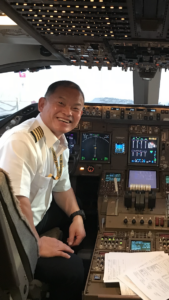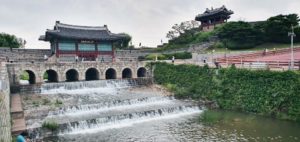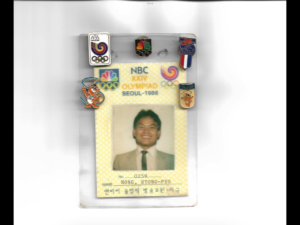In recognition of Asian American and Pacific Islander (AAPI) Heritage Month, we’re featuring our talented AAPI-identifying employees across the Company. AAPI Heritage Month is a time to reflect, celebrate and recognize the influence of Asian Americans and Pacific Islander Americans in our history, culture and achievements. Here at Atlas, we celebrate our AAPI colleagues and their contributions.

Captain Steve Hong.
This week, we meet Hyung Pyo (Steve) Hong, a 747 Captain at Atlas. Steve is originally from Suwon, South Korea and came to the U.S. in 1981 to study aviation to become a missionary pilot.
What was your career path and how did it lead you to Atlas?
I was born and raised in South Korea. My father owned rice fields near Suwon Air Force Base, and as a child, while I helped my dad in the fields, I loved watching the planes take off and land and dreamed of becoming a pilot.
My family became Christian, and from as far back as I can remember, I wanted to be a missionary pilot. A family we knew from church encouraged me to go to America to get my pilot’s license and recommended a college in Michigan that offered a Missionary Aviation Pilot and Mechanics program. I applied and was thrilled to be offered a full scholarship. During college, I worked in the school’s food service department, where I learned how to make American dishes like scrambled eggs and grilled cheese sandwiches.
Shortly after my graduation in 1988, I was hired as a junior flight instructor for Korean Air, based at Jeju Island (CJU). Four years later, I immigrated to the United States and established residency in Virginia Beach.

Steve took this photo of Hwa Hong Moon also known as “water gates,” a bridge over the Sumoncheon stream in Suwon.
Over the next 15 years, I flew for many different airlines, before landing at Polar in 2007, where I was hired to fly 747s.
How important is it to you that Atlas recognizes Asian American and Pacific Islander Heritage Month?
It is very important to me. Our company operates in so many Asian countries, so it’s especially important to recognize people with AAPI heritage. I’m so grateful that we operate in these countries, as it provides me with many opportunities to return home and reunite with friends and family.
Please share something that is unique about your culture.
I think that what is unique about the Korean people are resilient and persistent; we are survivors. We have been through so much, considering the Japanese occupation during World War II followed by the Korean War, but we still keep going. Despite all these hardships, the present day South Korean economic achievements are an example of our perseverance.
Which traditions are most important to you today?
One tradition I appreciate is respecting elders. It was very important to my father that his children respect our elders and treat them kindly.
Another favorite tradition of mine is Korean Thanksgiving, knowns as Chuseok or Hangawi. It is a mid-autumn harvest festival and a time for families to get together, enjoy good Korean food and have fun. During this holiday, we also visit gravesites to pay our respects to our ancestors and family members.
What’s a fun fact about you – personal or professional – most people at Atlas don’t know?
I think people would be surprised to know that I was a catering service manager for NBC sports during the Summer Olympics in 1988 in Seoul! My ability to both speak Korean and cook American food helped me secure this job.

Steve’s security badge from the 1988 Olympics in Seoul.
Do you have a role model or mentor in your life?
When I went to Grand Rapids, Michigan, I met Retired U.S. Air Force Pilot Colonel Clair McCombs, who was a dean of the Mission Aviation department at my college. He was a member of the United States Air Forces in Europe’s (USAFE) first super-sonic aerial demonstration team known as the Skyblazers in the 1960s. When I arrived in Michigan, I had never driven a car and didn’t have any prior mechanical training. But he told me not to give up and encouraged me along the way. I kept in touch with him over the years and was lucky to be able to visit him one last time in the summer of 2021 before he passed away at the age of 94.